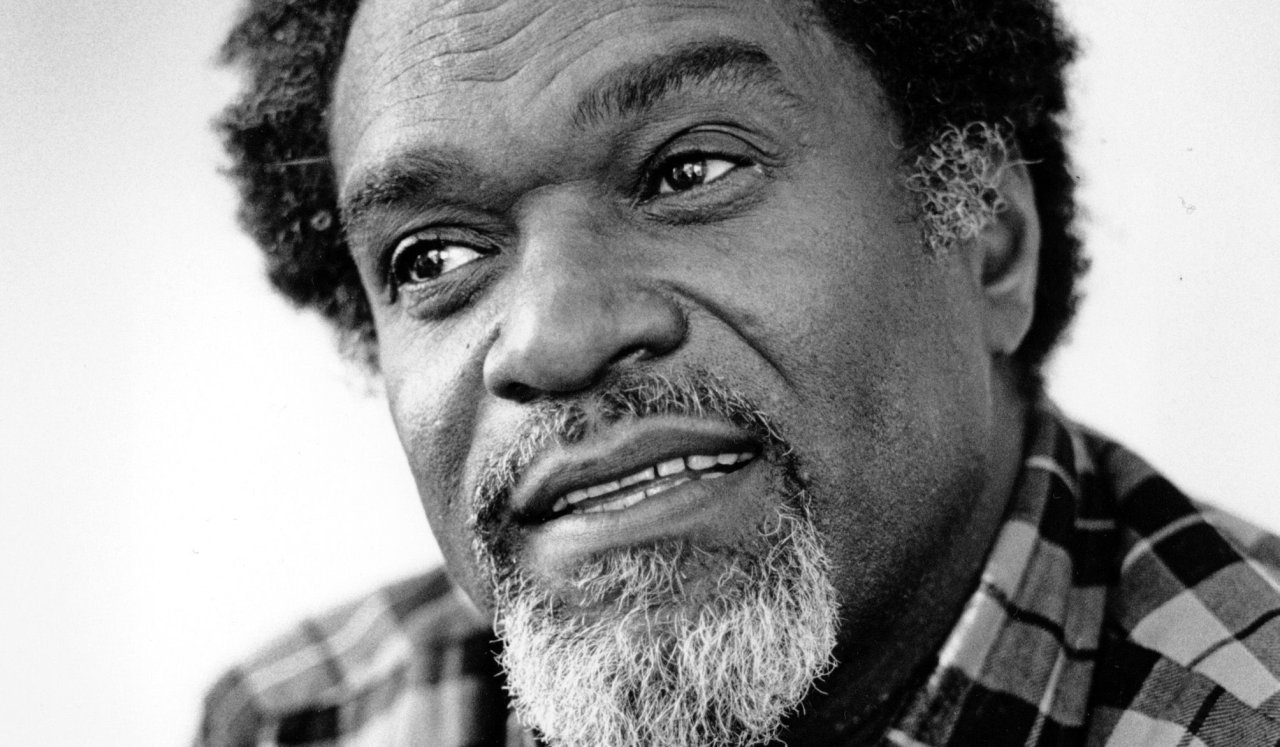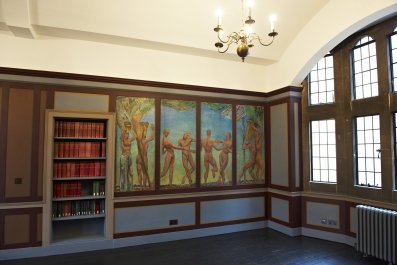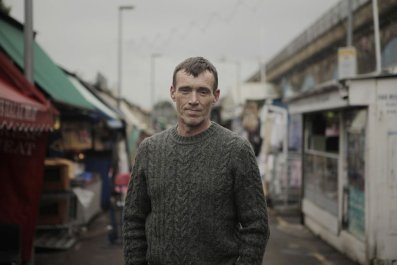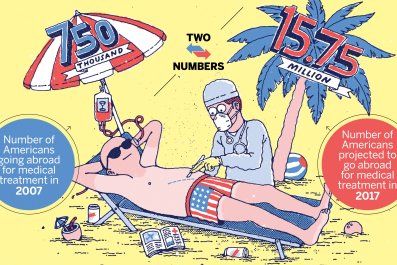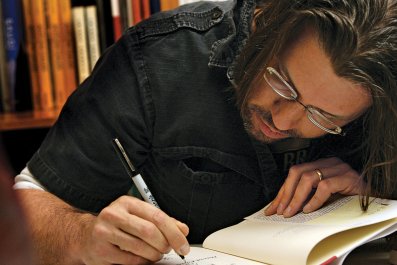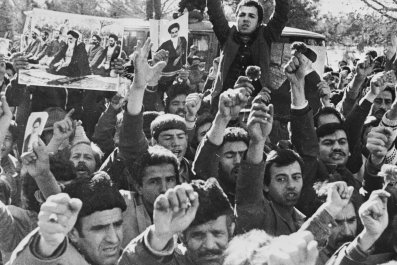A young black man stands in front of the New York Police Department's headquarters in Times Square. A crowd gathers around him and starts humming in harmony. "This congregation has come together to express its dissent of police matters," he raps. "In exercising our right to be heard, the only proper police protocol is to use excessive force. Forceful words. This is how we shoot back."
The young man is Daniel J. Watts, a writer and performer currently in Motown on Broadway. The crowd around him is made up of cast members from Kinky Boots, The Lion King, The Phantom of the Opera and other shows. They were brought together by Tony Award-winning producer Warren Adams and Brandon Victor Dixon, a Tony-nominated actor. Their company, WalkRunFly Productions, created this piece of guerrilla theater in July to speak out against police brutality following the death of Eric Garner on New York's Staten Island.
For Dixon and Adams, creating the performance seemed natural. "As artists, our job is to communicate thoughts and tell stories," says Dixon. "And this is a story we wanted to be a part of."
Both Dixon and Adams are keenly aware of the political legacy of black theater: from Langston Hughes to Sidney Poitier, African-American theater artists have used stories to ignite sociopolitical conversation. Yet, for these theater activists, few can compare in significance to Douglas Turner Ward, founder of the groundbreaking Negro Ensemble Company (NEC). "Those are the shoulders I stand on," says Watts. "Without them," says Adams, "there really wouldn't be us today." Michael Dinwiddie, an associate professor at New York University, calls the NEC "a truly visionary company intent on mining the stories of African-American people at a time when no one was doing it."
The NEC mentored the likes of Denzel Washington, Samuel L. Jackson, Laurence Fishburne, Phylicia Rashad, Delroy Lindo and Angela Bassett, yet Ward is almost unknown outside of the theater world.
He's now 84 and lives alone in New York's East Village. An operation for tongue cancer has made it difficult for him to speak. But his voice is still loud and clear and his eyes sharp as they relive the past.
He was born Roosevelt Ward Jr. on May 5, 1930, in Burnside, Louisiana. He seemed destined to play a part in America's race battles: His great-great-grandmother, Elnora, was owned as a slave by General Nathan Bedford Forrest, a founder of the Ku Klux Klan. Elnora bore Forrest a daughter, but fearing for their safety, she escaped to Louisiana.
Ward was raised in New Orleans, where he says he had "no interest" in theater but describes himself as a "precocious kid" with a passion for literature. As a teenager during World War II, Ward witnessed his uncles being drafted into a war "fighting for 'freedom,' when their own country afforded them only oppression and injustice."
Ward studied journalism at the University of Michigan. It was there, he says, that he became "radicalized." Students had begun protesting the segregation of Ann Arbor's movie houses, and Ward found himself at the center of the movement. He also discovered Marx and Engels' Communist Manifesto. "I thought they wrote it for me," he says.
In 1949, at the age of 19, Ward moved to Harlem, where he helped found the Labor Youth League and quickly rose in the ranks of New York's black leftist movement. Describing New York City at the time, Ward talks about police brutality, segregated neighborhoods and enormous inequality—in short, he says, "all the issues we face today." It was during this period that he discovered theater as a means of political activism. He began writing skits about daily events, to perform at meetings. Ward found the "impact of immediacy" offered by live performance electrifying.
But being part of a Communist group in the McCarthy era was dangerous. Like Paul Robeson, Ward found himself a government target. In 1949, Ward was arrested by the FBI for evading the draft and sent back to New Orleans to await trial. He was eventually acquitted, but during the 18-month legal process he wrote his first major play, The Trial of Willie McGee, based on the true story of an African-American man in Mississippi who was falsely convicted and executed for the rape of a white woman. He returned to New York, worked as a reporter for The Daily Worker and began taking acting classes with Paul Mann, who had taught both Ossie Davis and Sidney Poitier.
That same year, at the Hotel Theresa in Harlem, Ward held a reading of Willie McGee with Lorraine Hansberry and Lonne Elder III. According to Ward, the reading "helped ignite their ambition to become writers": Elder became the first African-American to be nominated for an Academy Award for writing; Hansberry became the first black woman to write a play performed on Broadway, with A Raisin in the Sun.
In 1957, The Daily Worker closed, and Ward decided to pursue a full-time career in theater. Within a year he had understudied Poitier in the role of Walter Lee Younger in A Raisin in the Sun on Broadway, and eventually he took over the role for the show's national tour. Ward remembers Poitier as "the greatest" but says he was "never right for the role" because Walter was from Mississippi and Poitier from the Bahamas.
Returning to New York, Ward performed in Jean Genet's The Blacks. The original cast of the show included James Earl Jones, Cicely Tyson and Maya Angelou. Yet despite this burgeoning of African-American talent, Ward recognized a profound gap in the New York theater scene. In 1966, Ward penned a landmark op-ed in The New York Times titled "American Theatre: For Whites Only." In order for African-American theater artists to thrive, he wrote, "the most immediate, pressing, practical, absolutely minimally essential active first step is the development of a permanent Negro company…. Not in the future, but now." The Negro Ensemble Company was formed in 1967, with Ward as founding artistic director, and quickly became a beacon for black actors across the country.
The NEC's first major success came in 1969 with Lonne Elder III's Ceremonies in Dark Old Men. The show was a huge hit—Ward remembers calling Elder up and saying, "You poor motherfucker—you're rich overnight."
There were offers to take Ceremonies to Broadway, but Ward refused. He felt it would compromise the NEC's ethos: Ward envisioned the company not as a commercial institution but as a creative locus. He had also seen other black companies ruined by Broadway before: When the American Negro Theatre took Anna Lucasta to Broadway in 1944, infighting and manipulation from white producers ruined the company.
The Great White Way eventually proved too alluring. In 1973, the NEC made its Broadway debut with The River Niger by Joseph Walker. The play had been a huge hit off-Broadway, winning the Obie for Best American Play. Ward, who directed and starred in the show, felt that the NEC had now established itself as a cutting-edge company and Broadway would not harm its reputation. The show won the 1974 Tony Award for Best Play.
Ward was "the best director I've ever worked with," says Charles Weldon, the current artistic director of the NEC, who performed in The River Niger. He says Ward used to "sit there reading the newspaper during rehearsals. People didn't get it. But the thing was, he was really listening. And you'd better hope he didn't put down that newspaper."
The NEC continued to have critical and commercial success throughout the '70s and early '80s, but the one play that truly defines the legacy of the Negro Ensemble Company is A Soldier's Play by Charles Fuller. Directed by Ward, it opened on November 20, 1981, and ran for 468 performances. The play won the Outer Critics Circle Award for Best Off-Broadway Play and the New York Drama Critics' Circle Award for Best American Play. It also won the 1981 Pulitzer Prize for Drama.
Awards aside, A Soldier's Play exemplifies what made the NEC and Ward legendary. A murder mystery inspired by Melville's Billy Budd, the play examined black tensions in a military context. As Frank Rich wrote in the New York Times's review, the play "tirelessly insists on embracing volatile contradictions because that is the way to arrive at the shattering truth."
Ward called it "The Blacks of this generation" because it was "the best combination of black actors ever." The cast included Denzel Washington, Samuel L. Jackson and Charles Brown. Ward had already decided whom to cast as Private Peterson when he got a phone call: "This is Denzel Washington. Are you still auditioning?" Ward replied, "If you can make it in the next hour, I'll see you." When Washington read for the part, Ward says, "it was instant. It was obvious that this was his role." Washington went on to star in the film version of the play and was catapulted to stardom.
Yet A Soldier's Play was also the NEC's last major success. An Internal Revenue Service investigation led to the company going into huge debt, in an effort to cover legal fees and the eventual tax payback, which was sizable. The theater continued to suffer financially, and following the critical failure of Fuller's epic WE, the NEC almost shut down. Charles Weldon had to rescue the company from bankruptcy.
The company now sits in a tiny office in Times Square. Dusty boxes filled with old playbills and scripts litter the shelves. Samuel Jackson and Denzel Washington stare down from old black-and-white photos. Weldon admits that he's "no rich man" and that maintaining the company is a struggle. Still, for him it's worth it, "to hold on to history. A history that was great. A history that so many great people were a part of."
Despite the work of the NEC and others, "racism is still the virus that plagues America," as Daniel J. Watts says. This has become apparent even in the theater world. Producers Adams and Dixon admit that there is just a handful of black directors, producers and writers working regularly on Broadway. They set up their company to change this, to give black artists "the chance to fly."



